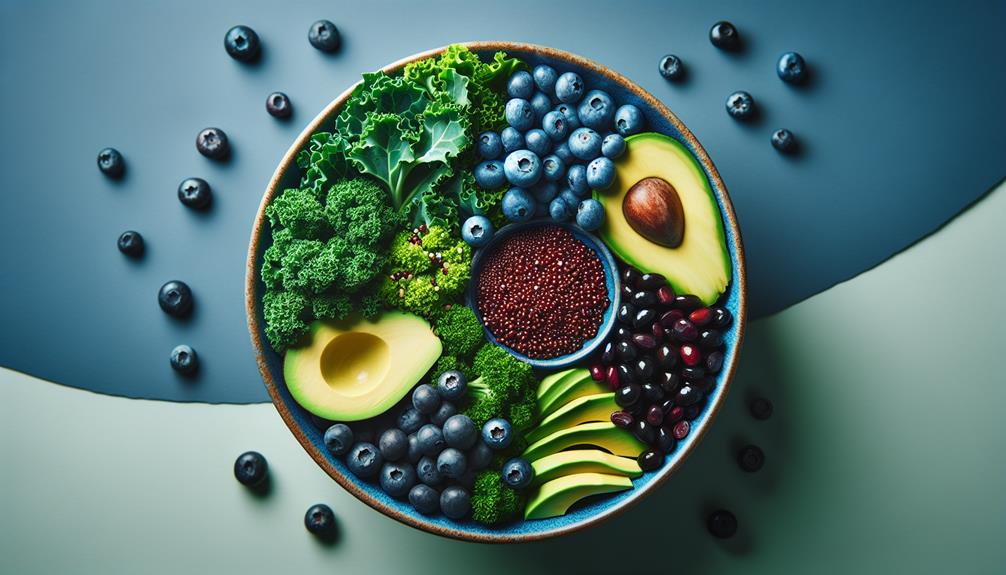Superfoods have become a sensationalized subject in the health and wellness world, but what's the truth behind all the buzz? Are these so-called superfoods truly worth the hype? Let's delve into the science behind these nutritional powerhouses and separate fact from fiction. Get ready to uncover the real deal when it comes to superfoods, and discover which ones are truly worth incorporating into your diet for optimal health and well-being. So, are you ready to take a closer look and uncover the secrets behind these mysterious superfoods?
Key Takeaways
- Superfoods are nutrient-dense foods that offer numerous nutritional benefits, as they are packed with vitamins, minerals, antioxidants, and phytochemicals.
- Examples of nutrient-dense superfoods include berries, leafy greens, salmon, and quinoa, which provide antioxidants, vitamins, minerals, omega-3 fatty acids, and fiber.
- Incorporating berries and seeds into your diet can provide numerous health benefits, such as protecting against chronic diseases, aiding in weight management, and promoting brain and heart health.
- It is important to debunk the myths and misconceptions surrounding superfoods, understanding that they are not a cure-all, can be found in everyday foods, and should be part of a balanced diet with other essential nutrients.
The Science Behind Superfoods
How do superfoods actually work to improve your health and well-being? Superfoods are nutrient-dense foods that offer numerous nutritional benefits, which can have a significant impact on your overall health. These foods are packed with vitamins, minerals, antioxidants, and phytochemicals that support various bodily functions and help prevent chronic diseases.
Superfoods are known for their high levels of antioxidants, which play a crucial role in neutralizing harmful free radicals in your body. By reducing oxidative stress, antioxidants help protect your cells from damage and lower the risk of developing diseases like cancer and heart disease.
Furthermore, superfoods are often rich in essential nutrients like fiber, omega-3 fatty acids, and vitamins C and E. These nutrients support a healthy immune system, promote proper digestion, and contribute to the maintenance of healthy skin and hair.
Additionally, many superfoods contain compounds that have anti-inflammatory properties. Chronic inflammation is linked to various health problems, including diabetes, obesity, and autoimmune diseases. Consuming superfoods can help combat inflammation and promote overall well-being.
Unveiling the True Nutritional Value
To truly understand the nutritional value of superfoods, it is important to delve into their composition and the specific nutrients they provide. Superfoods are known for their high nutrient density, which means that they contain a significant amount of vitamins, minerals, and antioxidants per calorie. This nutrient density is what sets them apart from other foods and contributes to their health benefits.
For example, berries such as blueberries, strawberries, and raspberries are packed with antioxidants that help protect the body against damage from free radicals. Leafy greens like kale and spinach are rich in vitamins A, C, and K, as well as minerals like iron and calcium. These nutrients are essential for maintaining healthy bones, skin, and immune function.
Another superfood with impressive nutritional value is salmon. It is an excellent source of omega-3 fatty acids, which have been shown to reduce inflammation and support heart health. Additionally, quinoa is a nutrient-dense grain that is high in protein, fiber, and various vitamins and minerals.
Superfoods Worth Incorporating in Your Diet

Incorporating superfoods into your diet can provide a wide range of health benefits. Two superfoods that are worth including in your daily meals are antioxidant-rich berries and omega-3 rich seeds.
Berries, such as blueberries, strawberries, and raspberries, are packed with antioxidants that help fight inflammation and protect against chronic diseases. They are also low in calories and high in fiber, making them an excellent choice for weight management and digestive health. You can easily add berries to your diet by enjoying them as a snack, adding them to your morning cereal or yogurt, or using them in smoothies.
Seeds, such as chia seeds, flaxseeds, and hemp seeds, are rich in omega-3 fatty acids, which are essential for brain health, heart health, and reducing inflammation in the body. They are also a great source of fiber, protein, and essential minerals. You can sprinkle seeds on top of salads, mix them into your oatmeal or yogurt, or use them in baking recipes.
Incorporating antioxidant-rich berries and omega-3 rich seeds into your diet can provide numerous health benefits. So, why not give them a try and enjoy the delicious flavors and nutritional benefits they have to offer?
Debunking Superfood Myths and Misconceptions
Now, let's uncover the truth behind common myths and misconceptions surrounding superfoods. Superfood marketing tactics often mislead consumers into believing that these foods possess extraordinary health benefits. However, it is important to separate fact from fiction. Here are some common superfood misconceptions:
- Myth #1: Superfoods are a cure-all: While superfoods are nutrient-dense and offer various health benefits, they cannot single-handedly prevent or cure diseases. No single food can replace a balanced diet and a healthy lifestyle.
- Myth #2: Superfoods are always exotic and expensive: Contrary to popular belief, superfoods can be found in everyday grocery stores, and they don't have to break the bank. Nutrient-packed foods like berries, spinach, and beans are just as beneficial as pricey alternatives.
- Myth #3: Superfoods can compensate for a poor diet: Incorporating superfoods into your diet is a great step towards better health. However, relying solely on superfoods while neglecting other essential nutrients can still lead to nutritional deficiencies.
Making Informed Choices: How to Identify Genuine Superfoods

When choosing superfoods, it is essential to be able to discern genuine options from those that are simply marketed as such. With the increasing popularity of superfoods, it's easy to come across impostor products that claim to offer extraordinary health benefits but may not deliver on those promises. To make informed choices, it is important to look for evidence-based information and consider whether a superfood aligns with your specific health concerns.
One way to identify impostor superfoods is to pay attention to the scientific evidence supporting their health claims. Genuine superfoods often have research studies or clinical trials backing up their touted benefits. Look for credible sources such as reputable scientific journals or organizations like the National Institutes of Health when evaluating the legitimacy of a superfood.
Additionally, consider whether a superfood addresses your specific health concerns. Not all superfoods are created equal, and what may work for one person may not be as effective for another. For example, if you're looking to boost your immune system, superfoods like elderberries or mushrooms may be more suitable than trendy options like goji berries or acai.
Frequently Asked Questions
Are There Any Risks or Potential Side Effects Associated With Consuming Superfoods?
There are potential risks and side effects associated with consuming superfoods. It's important to be aware of any allergies or sensitivities you may have, and to consume them in moderation for optimal health benefits.
Can Superfoods Alone Provide All the Essential Nutrients Needed for a Healthy Diet?
Superfoods alone cannot provide all the essential nutrients for a healthy diet. While they are packed with nutrients, they cannot replace traditional nutrient sources. Multivitamins can help fill in the gaps, but a balanced diet is still key.
What Is the Recommended Daily Intake of Superfoods for Optimal Health Benefits?
To get the optimal health benefits from superfoods, it's recommended that you incorporate them into your daily diet. The recommended daily intake varies depending on the specific superfood, so it's important to do your research.
Are There Any Specific Superfoods That Are Particularly Beneficial for Specific Health Conditions or Concerns?
Certain superfoods can be particularly beneficial for specific health concerns. However, it's important to be aware of the risks associated with consuming superfoods. Consult with a healthcare professional for personalized advice.
Can Superfoods Help With Weight Loss, and if So, Which Ones Are Most Effective?
Superfoods can help with weight loss by boosting metabolism and reducing cravings. Some effective options include green tea, berries, avocados, and lean proteins like salmon and chicken. Incorporating these into your diet can support your weight loss goals.
Conclusion
So, what's the verdict on superfoods? While there is no doubt that some foods pack a powerful nutritional punch, it's important to approach the hype with a critical eye. According to a study conducted by the American Heart Association, only 1 in 10 adults meet the daily recommended intake of fruits and vegetables. Instead of focusing on specific superfoods, let's work on incorporating a variety of nutrient-rich foods into our diets for optimal health.













